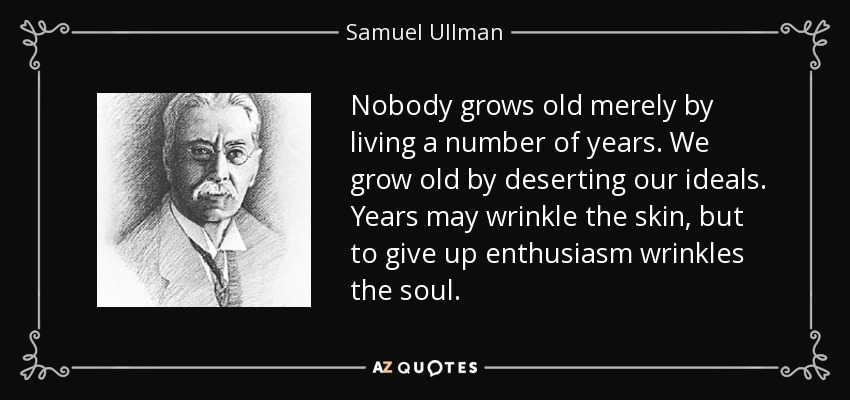風蕭蕭_Frank
以文會友年歲有加,並非垂老;理想丟棄,方墮暮年。
--- 王佐良譯 塞繆爾.厄爾曼《青春》
老驥伏櫪,誌在千裏;烈士暮年,壯心不已。
--- 三國 曹操
青春 YOUTH
作者: 塞繆爾·厄爾曼 Samuel Ullman 1840 -1924, 生於德國的美國作家。

兒時隨家人移居美利堅,參加過南北戰爭,之後定居伯明翰,經營五金雜貨,年逾70開始寫作。著作有知名散文《青春》等。
這篇70多年前寫的隻有四百多字的短文,首次在美國發表的時候,引起全美國轟動效應,成千上萬的讀者把它抄下來當作座右銘收藏,許多中老年人把它作為安排後半生的精神支柱。

美國的麥克阿瑟將軍在指揮整個太平洋戰爭期間,辦公桌上始終擺著裝有短文《年輕》複印件的鏡 框,文中的許多的詞句常被他在談話或開會作報告時引用。
後來此文傳到日本,文章的觀點成為許多日本人生活哲學的基礎。

鬆下公司的創始人鬆下幸之助說:“多年來,《年輕》始終是我的座右銘。”
Youth
by Samuel Ullman 1840 – 1924, he was an American businessman, poet, humanitarian. He is best known today for his poem Youth. http://www.prmvr.otsu.shiga.jp/library/master/samuelullman/youth.html
Youth is not a time of life; it is a state of mind; it is not a matter of rosy cheeks, red lips and supple knees; it is a matter of the will, a quality of the imagination, a vigor of the emotions; it is the freshness of the deep springs of life.
Youth means a temperamental predominance of courage over timidity of the appetite, for adventure over the love of ease. This often exists in a man of sixty more than a body of twenty. Nobody grows old merely by a number of years. We grow old by deserting our ideals.
Years may wrinkle the skin, but to give up enthusiasm wrinkles the soul. Worry, fear, self-distrust bows the heart and turns the spirit back to dust.
Whether sixty or sixteen, there is in every human being's heart the lure of wonder, the unfailing child-like appetite of what's next, and the joy of the game of living. In the center of your heart and my heart there is a wireless station; so long as it receives messages of beauty, hope, cheer, courage and power from men and from the Infinite, so long are you young.
When the aerials are down, and your spirit is covered with snows of cynicism and the ice of pessimism, then you are grown old, even at twenty, but as long as your aerials are up, to catch the waves of optimism, there is hope you may die young at eighty.
青春意味著勇敢戰勝怯懦,青春意味著進取戰勝安逸。年月的輪回就一定導致衰老嗎?要知道嗬,老態龍鍾是因為放棄了理想的追求。
無情的歲月的流逝,留下了深深的皺紋,而熱忱的喪失,會在靈魂深處打下烙印。焦慮、恐懼、自卑,終會使心情沮喪,意誌消亡。
60歲也罷,16歲也罷,每個人的心田都應保持著不泯的童心,去探索新鮮的事物,去追求人生的樂趣。我們的心中都應有座無線電台,隻要不斷地接受來自人類和上帝的美感、希望、勇氣與力量,我們就會永葆青春。倘若你收起天線,使自己的心靈蒙上玩世不恭的霜雪和悲觀厭世的冰淩,即使你年方20,你已垂垂老矣;倘若你已經80高齡,臨於辭世,若豎立天線去收聽樂觀進取的電波,你仍會青春煥發。
第四種版本
-- 三國 曹操
神龜雖壽,猶有竟時;
騰蛇乘霧,終為土灰。
老驥伏櫪,誌在千裏;
烈士暮年,壯心不已。
盈縮之期,不但在天;
養怡之福,可得永年。
幸甚至哉,歌以詠誌。
Samuel Ullman
Samuel Ullman (April 13, 1840 – March 21, 1924)was an American businessman, poet, humanitarian. He is best known today for his poem Youth, which was a favorite of General Douglas MacArthur. The poem was on the wall of MacArthur's office in Tokyo when he became Supreme Allied Commander in Japan. In addition, MacArthur often quoted from the poem in his speeches, leading to it becoming better known in Japan than in the United States.
Born in 1840 at Hechingen, Hohenzollern to Jewish parents, Ullman immigrated with his family, in 1851, to America to escape discrimination at the age of eleven. The Ullman family settled in Port Gibson, Mississippi. After briefly serving in the Confederate Army, he became a resident of Natchez, Mississippi. There, Ullman married, started a business, served as a city alderman, and was a member of the local board of education.
In 1884, Ullman moved to the young city of Birmingham, Alabama, and was immediately placed on the city's first board of education.
During his eighteen years of service, he advocated educational benefits for black children similar to those provided for whites. In addition to his numerous community activities, Ullman also served as president and then lay rabbi of the city's reform congregation at Temple Emanu-El. Often controversial but always respected, Ullman left his mark on the religious, educational, and community life of Natchez and Birmingham.
In his retirement, Ullman found more time for one of his favorite passions - writing letters, essays and poetry. His poems and poetic essays cover subjects as varied as love, nature, religion, family, the hurried lifestyle of a friend, and living "young." It was General Douglas MacArthur who facilitated Ullman's popularity as a poet - he hung a framed copy of a version of Ullman's poem "Youth" on the wall of his office in Tokyo and often quoted from the poem in his speeches. Through MacArthur's influence, the people of Japan discovered "Youth" and became curious about the poem's author.
In 1924, Ullman died at the age of 84 in Birmingham, Alabama.
In 1994, the University of Alabama at Birmingham and the Japan-America Society of Alabama opened the Samuel Ullman Museum in Birmingham's Southside neighborhood. The museum is located in the former Ullman residence and is operated by the University of Alabama at Birmingham.




